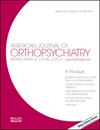Professional quality of life among Israeli social workers in hospitals and a health maintenance organization (HMO) during the COVID-19 pandemic.
IF 2.3
3区 医学
Q1 SOCIAL WORK
引用次数: 0
Abstract
We examined differences between social workers in hospitals versus social workers in community health services regarding levels of professional quality of life (ProQoL), proximity to COVID-19, resilience, perceived social support, and preparedness for the next pandemic during waves 3-5 of the COVID-19 pandemic in Israel (December 2020-December 2021, the main COVID-19 variants were Alpha and Delta). We also examined the moderating role of resilience, social support, preparedness for the next pandemic, and health care service type in the association between proximity to COVID-19 and ProQoL. Participants were 163 social workers from four hospitals and 98 social workers from a major health maintenance organization in the community. Social workers in both settings revealed moderate-high levels of compassion satisfaction and moderate levels of burnout and secondary traumatic stress. The study's model indicated that after controlling for the effects of the covariates, higher levels of self-reported-resilience and greater perceived organizational support were associated with higher compassion satisfaction and lower burnout and secondary traumatic stress. Furthermore, a stronger sense of preparedness for the next pandemic was related to lower levels of burnout. The model indicated that the effects of organizational support, informal social support, and preparedness on compassion satisfaction were dependent on the study group (i.e., working in hospital or community settings). Findings indicate that intervention programs should be implemented to help increase compassion satisfaction and prevent/reduce burnout and secondary traumatic stress among social workers in health care settings during health care crises. Enhancing resilience and preparedness should focus not only on the social workers as individuals but also on the institutions for which they work. (PsycInfo Database Record (c) 2024 APA, all rights reserved).在 COVID-19 大流行期间,医院和健康维护组织 (HMO) 中的以色列社会工作者的职业生活质量。
我们研究了在以色列 COVID-19 大流行的第 3-5 波期间(2020 年 12 月至 2021 年 12 月,COVID-19 的主要变体为 Alpha 和 Delta),医院社工与社区卫生服务机构社工在职业生活质量(ProQoL)水平、与 COVID-19 的接近程度、复原力、感知到的社会支持以及对下一次大流行的准备程度方面的差异。我们还研究了复原力、社会支持、对下一次大流行的准备程度以及医疗保健服务类型在接近 COVID-19 与 ProQoL 之间的关联中的调节作用。参与者包括来自四家医院的 163 名社工和来自社区一家大型医疗机构的 98 名社工。两种环境中的社工都显示出中等偏上的同情满意度,以及中等偏上的职业倦怠和二次创伤压力。研究模型表明,在控制了协变量的影响后,较高的自我复原力水平和较强的组织支持感知与较高的同情满意度、较低的职业倦怠和二次创伤压力相关。此外,为下一次大流行做好更充分准备的意识与较低的职业倦怠水平相关。该模型表明,组织支持、非正式社会支持和准备程度对同情心满意度的影响取决于研究小组(即在医院或社区环境中工作)。研究结果表明,应实施干预计划,帮助医疗机构中的社会工作者在医疗危机期间提高同情心满意度,预防/减少职业倦怠和继发性创伤压力。增强社会工作者的抗压能力和准备工作不仅应关注社会工作者个人,还应关注他们所服务的机构。(PsycInfo Database Record (c) 2024 APA, 版权所有)。
本文章由计算机程序翻译,如有差异,请以英文原文为准。
求助全文
约1分钟内获得全文
求助全文
来源期刊
CiteScore
5.70
自引率
3.00%
发文量
74
审稿时长
6-12 weeks
期刊介绍:
The American Journal of Orthopsychiatry publishes articles that clarify, challenge, or reshape the prevailing understanding of factors in the prevention and correction of injustice and in the sustainable development of a humane and just society.

 求助内容:
求助内容: 应助结果提醒方式:
应助结果提醒方式:


